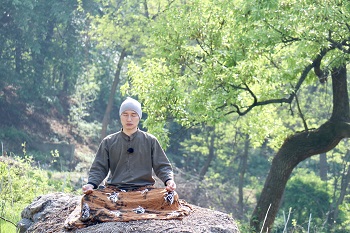
The famous US-based Massive Open Online Course (MOOC) platform “Coursera” exploded in popularity on launching the course “Buddhism and Modern Psychology.” Many students have used it as their guide to the world of meditation.
As of 2019, the course led by visiting researcher at Princeton, Bob Wright, has over 286,000 enrolled students, who learn from video materials, engage in online discussions, and write essays on how to apply Buddhist principles to modern thinking.
“When I took this course, I was astounded by how engaging an online course could be on Buddhism and modern psychology – it was a truly sound academic approach to the everyday questions I had on the subject of mindfulness,” said Kim Ok Soo-hyun, a sophomore student in Ewha’s Division of International Studies (DIS).
As Kim pointed out, mindfulness is a popular theme not only in Korea, but worldwide as well.
“For me, meditation is more than just breathing, stretching or yoga,” said Susana Denouel, a French student in her sophomore year of DIS.
“I have adopted meditation in such a way that it has become more of a lifestyle choice I make, in the foods I eat, in the positive thinking I engage myself in, and the general attitude I have in life. Sport has always been a big part of my life, and yoga especially has many overlapping philosophies with meditative practices. There is a book entitled ‘Le Yoga du corps et de l’esprit’ (Yoga for the mind and body) that I use to do yoga, and it really goes to show that all these meditative practices can be self-taught and internalized,” she said.
As the idea of mindfulness practices and programs has gained traction and become widespread in Korea, a large number of institutions, camps, workshops, and programs sprung up.
Just in the proximity of Ewha, the Naver Map application shows 1,398 centers of mixed nature that all link themselves with meditation. These establishments include meditation centers, yoga studios and large franchises such as Meditation Life, which has 330 branches throughout Korea.
“The issue with meditation is that we don’t have a strong sense of what it includes and what it does not – it can include everything from helping with efficiency, concentration, yoga, digital detox, self-control…the list is endless,” said one anonymous student from Ewha’s department of Brain and Cognitive Sciences.
Chae Hwan, who directs Chaehwan Meditation Center, and runs a meditation channel on YouTube with 84,000 subscribers, confirmed the difficulty of identifying true meditation experts.
“Meditation now takes so many forms, and fulfills so many purposes, such as being subject matter for company workshops, personal stress release or mind control techniques for students. It is hard to pinpoint who the true experts are,” he said.
“I would define a meditation expert as someone who has seen the effect of meditation himself and is able to transmit this state of being to others.”
A multi-faceted approach in which meditation is a key marketing phrase or key solution for modern problems is nothing new.
The Hu program is the Hankyoreh’s seasonal program on using meditation techniques to tackle stress. The daily newspaper has run this program with many municipal governments, middle and high schools, and NGOs.
“The program that I participated in called the detox-fasting camp was held for three days, and used meditative techniques to help with controlling our appetite” said Choi Hyun-gi, who participated in the Hu program in April at Gyeryong mountain.
“I think the experience was worth it, but the sad truth is, people need to pay so much and force themselves into such an environment to start focusing and meditating.”
As of now, there is no definitive answer to the overall effect of meditative practices in solving modern day problems.
“I think it’s really up to the meditator to establish his or her relationship to meditation, and make meaning themselves rather than merely follow the trend,” said Denouel.

